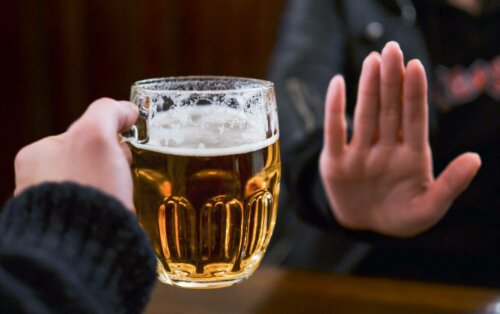Limit These Types of Food for the Health of the Liver


Written and verified by Doctor Carlos Fabián Avila
You must adopt and maintain good life habits in order to maintain the health of the liver — always, not only when you want to obtain a specific benefit. Furthermore, you must take into account that an adequate diet is essential within this kind of lifestyle.
Through it, the body can obtain all the ingredients it needs to function properly. Therefore, eating healthy isn’t only a matter of “taking care of your figure” but of investing in your health.
In relation to this particular point, we’ll now tell you more about which foods you should avoid if you want to have a healthy liver.
The liver, a multifunctional organ
The liver has more than one function in the body. Therefore, when it fails, your health suffers greatly. Basically, it’s the great “distributor” of nutrients and energy in the body: it processes, stores, transforms, and sends them to different parts of the body.
On the other hand, you must remember that it’s the largest solid organ in the body. It’s located in the upper right part of the abdomen and is about the size of a football.
Functions of the liver
- Removes toxins from your bloodstream
- Helps the blood to clot
- Stores vitamins and minerals
- Produces bile and helps digest fats
- Your liver converts stored sugars into energy that your body can use
- Produces the cholesterol that the body needs.
Symptoms of liver disease
An unhealthy diet can lead to the development of liver diseases like hepatitis, cirrhosis, fatty liver disease, and cancer.
Some of the signs and symptoms of liver disease are:
- Chronic fatigue
- Loss of appetite
- Nausea or vomiting
- Dark-colored urine
- Swelling and abdominal pain
- Swelling in legs and ankles
- Yellowish skin and eyes (jaundice)
- Pale colored stools, or stools that are bloody or tarry
Check out these Five Remedies to Cleanse the Liver
Causes of liver disease
There are many causes, but there are two that we can highlight:
- Poor nutrition. Excesses of various kinds, not prioritizing the consumption of healthy and fresh foods (such as vegetables, legumes, and greens), consuming excessively saturated fats, sausages, and industrial and ultra-processed foods, etc.
- Excessive alcohol consumption
Types of food that impair the health of the liver
You must know which types of food to avoid in excess in order to protect the health of your liver.
1. Sugar

Eating desserts, sugary sodas, candies, and other kinds of sweets made with refined sugars are all risk factors because the excess sugar is transformed into fat inside.
That is hepatic steatosis or what’s commonly known as fatty liver.
2. Salt
Too much salt intake increases your blood pressure, as well as your risk of fatty liver disease. In addition, it’s important to read the labels on the products you eat to check the amount of added sodium.
3. Overly spicy food can affect the health of the liver
The emphasis is usually placed on moderate salt intake; although, it’s equally advisable to emphasize the moderate use of spices and other seasonings in accordance with the recommendations of the World Health Organization.
Spicy or highly seasoned foods can also cause all sorts of discomfort and damage to the digestive system. This’s why it’s so important to moderate their use when using them in the kitchen.
4. Limit your consumption of alcohol

Alcoholic beverages interfere with your liver’s normal function. They produce a chemical imbalance and destroy liver cells, which can lead to hepatitis or cirrhosis.
Check out these Nine tips to detox your body naturally
5. Limit saturated fats for the health of the liver
Fatty foods have lots of calories and high triglyceride levels (which can damage the liver). To maintain a healthy liver you need to reduce your consumption of butter, fatty meats, mayonnaise, cream, and sausage.
6. White and refined flours
Carbohydrate consumption in large quantities can prevent your body from using fat as energy. Rather than burning it, it causes it to accumulate. This is because the carbohydrates are converted into fat and stored in adipose tissue. The result is weight gain and obesity.
7. Limit your consumption of fried foods

Fats or lipids consumed in excess are harmful to your health since they can be deposited in fat cells, mainly in abdominal adiposity.
This, in turn, is a risk factor for the development of diseases, such as type 2 diabetes or cardiovascular disease.
8. Medication can affect the health of the liver
Some medications can have side effects if they’re taken incorrectly or when mixed with alcohol. Liver damage is one of those undesirable effects.
Therefore, you should consult with your doctor to evaluate the medication and dosage you take.
Follow these recommendations for the health of the liver:
Scientists at the Catalan Association of Liver Patients (ASSCAT) recommend the following:
“Considering the different functions of each organ, we’re made of what we eat. So make sure you choose the right fuel for your body, the most valuable tool to meet all the challenges that inspire it.”
Therefore, it’s ideal to maintain a balanced diet, good hydration, and, in general, a healthy lifestyle. At the same time, it’s advisable to avoid the consumption of alcohol, industrial and ultra-processed foods, as well as tobacco.
All cited sources were thoroughly reviewed by our team to ensure their quality, reliability, currency, and validity. The bibliography of this article was considered reliable and of academic or scientific accuracy.
This text is provided for informational purposes only and does not replace consultation with a professional. If in doubt, consult your specialist.








